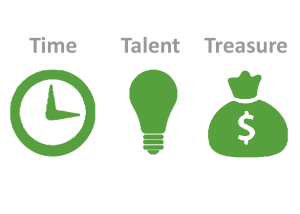Financial Planning – Charitable Giving
“The best way to find yourself is to lose yourself in the service of others.” – Mahatma Ghandi
End of the year financial planning usually entails a conversation about income taxes and some degree of tax planning. Among the various tax reduction strategies, charitable giving is always on the list. Interestingly, the latter part of the year involves numerous “giving” opportunities: from the non-tax deductible ones like Christmas, Hanukkah, Thanksgiving, political campaigns, etc. to the possible tax-deductible [non-profit 501(c)(3)] charities within our community, churches and religious groups, and we can’t forget our collegiate alma mater(s); after all, we are in the middle of college football season. While the financial benefits of giving (i.e. possible tax savings) have been at the forefront of typical financial planning recommendations, we would like to highlight three benefits of giving that go beyond tax deductions. The more significant benefits from giving are 1) improved health, 2) character development and 3) ultimate fulfillment.
Health Benefits from Giving
Recent studies show that giving can actually be associated with health benefits. In fact, life expectancy has been shown to increase for people who spend time giving versus those who do not. There are physical and neurological benefits to giving. According to the National Institute of Health, when people give to charities, it activates regions of the brain associated with pleasure, social connection, and trust, creating a ‘warm glow’ effect. So giving not only ‘does good,’ but feels and can make you “look” good. A University of California, Berkeley study found that elderly people who volunteered for two or more organizations were 44 percent less likely to die over a five-year period than were non-volunteers. One reason for this is that it may decrease stress and lower blood pressure, which is linked to many health problems. These physiological benefits are an unexpected bonus to altruism.
Character Development
In Rabbi Daniel Lapin’s book “Thou Shall Prosper” he talks about how giving focuses you outside of yourself. “It keeps arrogance and greed at bay, while helping you see the needs of others. Giving makes you feel good about yourself, and helps to erase doubt as to whether or not you’re worthy of financial success. It allows you to see yourself as a giver, not a taker. Giving enhances your mood and allows you to feel large, benevolent, and expansive instead of desperate, greedy, and petty.” These traits make one more attractive as a friend, spouse, and employee. People will naturally want to interact with someone who exudes these characteristics. In essence, as people want to be around/do business with people they like, your odds for such success improve through giving as your character develops.
Source: http://www.cfinancialfreedom.com/ten-commandments-making-money-act-rich-never-retire/
Ultimate Fulfillment
Ralph Waldo Emerson stated “The purpose of life is not to be happy. It is to be useful, to be honorable, to be compassionate, to have it make some difference that you have lived and lived well.” If we can agree that money by itself does not bring happiness, then we can see how it’s use for good, honor, and compassion leads to a life well lived. Emerson touched upon the fact that ultimate fulfillment is derived from living our lives on purpose. At Allgen we often say that money is not the “end” but a means to an end. The pursuit of defining this “end” for yourself encompasses learning your purpose in life. We define Financial Freedom not only as achieving financial independence but aligning your time, treasure, and talents to your ultimate purpose. And in turn, this dynamic leads to more fulfilling lives.
Money from one’s treasure is probably the first form of giving that comes to mind. Money is essential to organizations in order for them to continue their good work. While money is tangible, many people also give in non-tangible ways with their time and talents. Most of us have needed or will need help from others at some point in our lives, whether it is children taking elderly parents to doctor’s appointments, paying someone’s utility bill, or a nurse volunteering in underserved populations where you or a loved one is impacted. These acts of kindness are essential to creating and improving a community. Giving of our time, talents, and treasure brings us closer to creating a better world.
Within our own Allgen client community, we commonly hear personal stories of how others have impacted our immediate community. Two nurses and a doctor decided to create a mobile health care facility which travels to low income neighborhoods, offering free medical screenings and health care. Another couple puts together Ziploc bags filled with soap, toothpaste, first aid, and food, which they pass out to the homeless in downtown Orlando.
Paying It Forward
There is a magical alchemy of money, a metaphysical phenomenon which claims “the more I give the more I receive.” While the “receipt” may be financial gain, more often it comes in the form of 1) health benefits, 2) character development and 3) ultimate fulfillment. Allgen’s path to financial freedom promotes significance through generosity which helps one have a greater impact while on this earth and gives a higher purpose to one’s life.
Life is happening, shouldn’t your financial plan be happening also? Talk to your Allgen advisor. We’re here for you.
Written by Ana Fernandez, CFP® and Teresa Talton, CFP® Candidate with Allgen Financial Services, Inc. Certified Financial Planner Board of Standards Inc. owns the certification marks CFP®, Certified Financial Planner™ and CFP® in the U.S., which it awards to individuals who successfully complete CFP Board’s initial and ongoing certification requirements.






